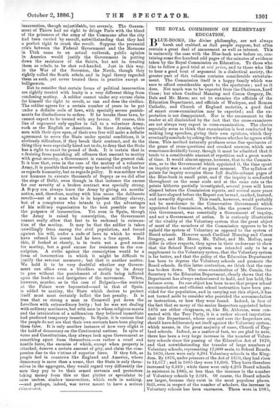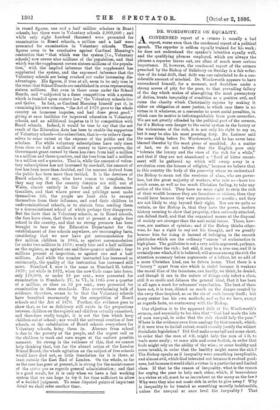THE ROYAL COMMISSION ON ELEMENTARY EDUCATION.
BLUE-BOOKS, like divine philosophy, are not always harsh and crabbed, as dull people suppose, but often contain a great deal of amusement as well as interest. This is eminently the case with the Blue-book now before us, con- taining some five hundred odd pages of the minutes of evidence taken by the Royal Commission on Education. To those who like to follow a good trial at nisi pries, and to those who like to hear a good bout of argument in a dialectical society, the greater part of this volume contains considerable entertain- ment. The Commission itself is a happy family which was sure to afford considerable sport to the spectators ; and so it does. Not much was to be expected from the Chairman, Lord Cross ; but when Cardinal Manning and Canon Gregory, Dr. Dale and Mr. Morse, are set to examine the officials of the Education Department, and officials of Wesleyan, and Roman Catholic, and Church of England societies, a good deal of smart cross-examination may be expected ; and the ex- pectation is not disappointed. Nor is the amusement to the reader at all diminished by the fact that the cross-examiners are not always very expert in cross-examination. The clerics especially seem to think that examination is best conducted by making long speeches, giving their own opinions, which they eventually conclude by asking the witness whether he agrees with them. This method naturally produces some fine specimens of the game of cross-questions and crooked answers, which are sometimes decidedly funny, though it must be admitted that it tends to a considerable amount of repetition and a great waste of time. It would almost appear, however, that to the Commis- sion, as to the Government which appointed it, the time spent on inquiry was a matter of no great moment. The syllabus of points for inquiry occupies three full double-column pages of the Blue-book in small print, and if the inquiry is conducted throughout on the same scale and at the same rate as the points hitherto partially investigated, several years will have elapsed before the Commission reports, and several more years will have elapsed before the Report can be read, marked, learned, and inwardly digested. This result, however, would probably not be unwelcome to the Conservative Government which appointed the Commission, which, like the present Conserva- tive Government, was essentially a Government of inquiry, and not a Government of action. It is curiously illustrative of the vitality of the Voluntary system that the great object of most of the members of the Commission appears to be to uphold the system of Voluntary as opposed to the system of Board schools. However much Cardinal Manning and Canon Gregory, and Mr. Morse, Mr. Talbot, and Mr. Molloy, may differ in other respects, they agree in their endeavour to show that the School Board system was intended only to be a supplement to the Voluntary system, that the Voluntary system is far better, and that the policy of the Education Department has been to depress the Voluntary schools and promote the Board schools. In this latter contention, we think that the case has broken down. The cross-examination of Mr. Cumin, the Secretary to the Education Department, clearly shows that the Department has always endeavoured to hold, and has held, the balance even. Its one object has been to see that. proper school accommodation and efficient school instruction have been pro- vided for the population, and in carrying out this object, it has not turned aside to consider who provided the accommodation or instruction, or how they were found. Indeed, in face of the fact that so many of the senior Inspectors appointed before 1870 are either clergymen, or, like Mr. Alderson, were con- nected with the Tory Party, it is a rather absurd imputation that the Department, whose eyes and ears the Inspectors are, should have deliberately set itself against the Voluntary system, which means, in the great majority of cases, Church of Eng- land schools. Indeed, as a matter of fact, we are glad to note, there has been a very large increase in the number of Volun- tary schools since the passing of the Education Act of 1870, and that notwithstanding the transfer of large numbers of Voluntary schools, representing 17,000 seats, to School Boards.
In 1870, there were only 8,281 Voluntary schools in the King- dom. By 1876, under pressure of the Act of 1870, they had risen to 12,677 ; and in 1885 they were 19,600. They have therefore increased by 6,319 ; while there were only 4,295 Board schools in existence in 1885, or less than the increase in the number of Voluntary schools by 2,024. Of course, the Board schools are larger, because they exist in the most populous places. Still, even in respect of the number of scholars, the increase in Voluntary schools has been enormous. There were in 1885,
in round figures, one and a half million scholars in Board schools, but there were in Voluntary schools 2,800,000 ; and while only eight hundred thousand were presented for examination in Board schools, a million and a half were presented for examination in Voluntary schools. These figures seem to be conclusive against Cardinal Manning's contention that " that which was the system [i.e., Voluntary schools] now covers nine millions of the population, and that which was the supplement covers sixteen millions of the popula- tion," with the implied inference that the supplement has supplanted the system, and the expressed inference that the Voluntary schools are being crushed out under increasing dis- advantages. His figures, if true at all, seem to be only true in the sense that School Boards are established in areas representing sixteen millions. But even in those areas under the School Boards, and " subjected to a fierce competition with a system which is founded upon statute law," the Voluntary schools live and thrive. In fact, as Cardinal Manning himself put it, in examining his own witness, " the Act of 1870 gave to the whole country an immense impulse, and had done great good," giving at once facilities for improved education in Voluntary schools, and an additional impetus to it by competition with Board schools. Indeed, it would be tale to say that the net result of the Education Acts has been to enable the supporters of Voluntary schools—the subscribers, that is—to relieve them- selves to some extent at the expense of the public and the scholars. For while voluntary subscriptions have only risen from close on half a million of money to three-quarters, the Government grant earned by them has risen from half a million to a million and three-quarter; and the fees from half a million to a million and a quarter. That is, while the amount of volun- tary subscriptions has not increased by one-half, the amount of fees has been more than doubled, and the amount derived from the public has been more than trebled. It is the devotees of Board schools, if any, who have reason to complain, for they may say that the country dishicts are still, out of Wales, almost entirely in the hands of the denomina- tionalists, and that where power and privilege most make themselves felt, the people are least able to exempt themselves from their influence, and send their children to undenominational schools, or to abstain from sending them to a denominational school of which perhaps they disapprove. But the facts that in Voluntary schools, as in Board schools, the fees have risen, that there is not at present a single free school in the country, and that no strong pressure has been brought to bear on the Education Department for the establishment of free schools anywhere, are encouraging facts, considering that we now have got accommodation for five million children in 1885, as against accommodation for under two millions in 1870 ; nearly four and a half millions on the register, as against one and three-quarter millions ; four millions present at inspection, as against one and a half millions. And while the number instructed has increased so enormously, the quality of the instruction has increased still more. Standard I. now is the same as Standard IL before 1870 ; yet while in 1872, when the new Code came into force, only 118,000, or under 18 per cent, were presented for examination in Standards IV. to VI., in 1885 over a quarter of a million, or close on 33 per cent., were presented for examination in those standards. The overwhelming bulk of evidence, therefore, seems to be that the Voluntary schools have benefited enormously by the competition of Board schools and the Act of 1870. Further, the evidence goes to show that, so far as deficiency still exists in the proportions between children on the register and children actually examined, and therefore really taught, it is not the fees which keep children out of school ; nor would the universal creation of free schools, or the substitution of Board schools everywhere for Voluntary schools, bring them in. Absence from school is due to the poverty of the people, and the urgent call on the children to work and earn wages at the earliest possible moment. So strong is the evidence of this, that we cannot help thinking that, but for the absurd action of the London School Board, the whole agitation on the subject of free schools would have died out, so little foundation for it is there, at least outside the East End of London. On the whole, so far as the case has gone at present,it is strong for the maintenance of the status quo as regards general administration ; and that is a good result, for it is only when we have a fair working system that we can hope to try it for tiros sufficient to allow of a decided judgment. To some disputed points of important detail we shall refer another time.



































 Previous page
Previous page